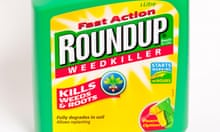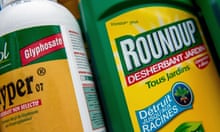A mutiny by several EU states has forced the postponement of a vote in Brussels on relicensing a widely used weedkiller that the World Health Organisation has found is probably carcinogenic.
Italy joined France, Sweden and the Netherlands in opposing a new 15-year licence for glyphosate at a meeting which had been expected to rubber stamp its reapproval on Tuesday.
The European commission may now bring forward a new proposal to cut the licence’s length, or create a list of “co-formulants” whose use can be limited or banned. These surfactants increase a plant’s uptake of glyphosate, and can be more dangerous than the herbicide alone.
But the Netherlands is calling for the relicensing to be put on hold until after a separate evaluation of glyphosate’s toxicity next year.
Greenpeace EU’s food policy director, Franziska Achterberg, said: “Rushing to grant a new licence now, without waiting for an evaluation by Europe’s chemical agency, would be like skydiving without checking your equipment first. As long as there is conflicting scientific advice, glyphosate should not be approved for use in the EU.”
Industry groups were shocked by the delay to the vote however, which they blamed on political interference by environmentalists.
Jean-Charles Bocquet, the director of the European Crop Protection Agency, said: “We are very upset that countries were influenced by significant political pressure from the environment committee of the European parliament, NGOs and the precautionary principle.”
If no new arrangement is found then the licence for glyphosate, a core ingredient in Monsanto’s $5bn-a-year Roundup brand, will expire at the end of June.
The next EU pesticides committee meeting is on 18-19 May, but the issue could also be discussed at a plant and animal health meeting, one month before.
A commission spokesperson said: “We would like a solid majority to take a decision on this kind of issue and some member states had sceptical observations that we will have to answer, so it [a postponement] was the wise thing to do.”
Among the national experts from the EU’s 28 countries, the UK pushed strongly for a vote today, while Germany expressed “no position”, due to disagreements between the country’s environment and agriculture ministries.
A high-profile spat over glyphosate’s safety between the EU’s regulatory body, the European Food Safety Authority (Efsa) and the UN’s World Health Organisation’s cancer agency, IARC, contributed to the stasis.
Efsa had disputed an IARC finding that glyphosate was “probably carcinogenic to humans” but Professor Chris Portier, a specialist contributor to the IARC report, said that their stance had been vindicated by events in Brussels today.
He told the Guardian: “France saying that they want glyphosate banned because of IARC’s call is a bit of a vindication of our position. But I would have been much happier if Efsa had come back and said they were now going to label glyphosate as ‘probably carcinogenic to humans’.”
A rancorous dispute between the two groups developed last summer, with 96 leading scientists calling on the EU’s health commissioner, Vytenis Andriukaitis, to disregard the Efsa assessment because it was “not credible”.
Monsanto, which manufactures glyphosate-resistant GM crops for use with Roundup, declared its “outrage” at the IARC report and filed a legal challenge in the US.
But public unease led 1.4 million people to sign a petition against glyphosate in the biggest online campaign since neonicotinoid pesticides were banned during the last commission.
No one at the EU’s negotiating table is talking about prohibitions, but green groups were quick to claim today’s stalemate as a victory.
“Despite the UK and the European commission lining up to protect Monsanto’s interests, governments across Europe have refused to treat their people as lab rats and approve a new licence for glyphosate,” said Alice Jay, the campaign director of Avaaz, which organised the petition. She added that the group would like to see glyphosate itself banned, rather than just co-formulants.










Comments (…)
Sign in or create your Guardian account to join the discussion